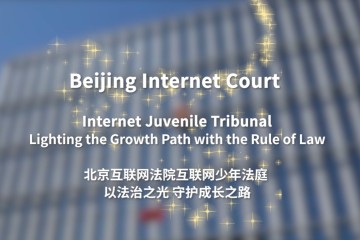Beijing Internet Court continues to improve internet-related IP protection
The Beijing Internet Court held an online press conference on judicial protection of internet-related intellectual property rights on April 22, just before World Intellectual Property Day which falls on April 26.
The live press conference, themed on convenient litigation services promote green development, was hosted by Sun Mingxi, director of the court's Trial Management Office.
The court's trials of IP cases, technology-based judicial protection modes and judicial rules on internet-related IP cases were briefed by Lu Zhengxin, presiding judge of the court's 1st Comprehensive Division.
Since it was founded, the Beijing Internet Court has been upholding the judicial concepts of appropriate protection, encouraging innovation and technology neutrality, and the basic principles of balancing the legalization of rights as well as the protection of rights and interests, said Lu.
Through online litigation, the court has helped to improve protection for internet-related IP rights. It has offered reliable judicial services and guarantees for strengthening judicial protection of IP rights by following a green development path.
Lu said the court will continue to improve the online litigation mechanism that meets the judicial needs of the public in this internet age. More efforts will be made to refine the judicial rules which are in line with the laws of internet development and establish an ecosystem for internet IP rights protection so that to ensure an green and ordered internet environment.
Zhang Lianyong, vice-president of court's second division released ten typical IP cases at the livestreaming.
Fifteen deputiesto Beijing Municipal People's Congress attended this conference online. They lauded the court after the livestreaming saying that it has strengthened protection of internet-related IP rights by among other measures using judicial blockchain technology and refining judicial rules.

 Judicial White Paper
Judicial White Paper
 Play
Play Play
Play Online Lawsuit Guide
Online Lawsuit Guide Beijing Internet Court Lawsuit Service WeChat Account
Beijing Internet Court Lawsuit Service WeChat Account  Beijing Internet Court WeChat Account
Beijing Internet Court WeChat Account